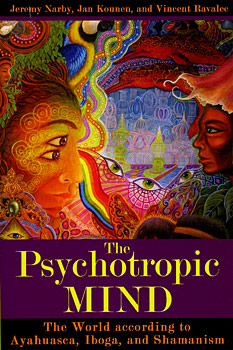
[an error occurred while processing this directive]
With rare sincerity and depth, noted anthropologist Jeremy Narby, filmmaker Jan Kounen, and writer/filmmaker Vincent Ravalec explore the questions of sacred plants, initiations, hallucinogens, and altered states of consciousness, looking at both the benefits and dangers that await those who seek to travel this path. Focusing specifically on ayahuasca and iboga, psychotropic substances with which the authors are intimately familiar, they examine how we can best learn the other ways of perceiving the world found in indigenous cultures, and how this knowledge offers immense benefits and likely solutions to some of the modern world's most pressing problems.
-- Rick Strassman, author of DMT: The Spirit Molecule and clinical associate professor of psychiatry, University of New Mexico School of Medicine
BACK COVER #
In the Amazon, shamans do not talk in terms of hallucinogens but of tools for communicating with other life-forms. Ayahuasca, for example, is first and foremost a means of breaking down the barrier that separates humans from other species, allowing us to communicate with them. The introduction of plant-centered shamanism into the Western world in the 1970s was literally the meeting of two entirely different paradigms. In The Psychotropic Mind, three of the individuals who have been at the forefront of embracing other ways of knowing look at the ramifications of the introduction into our Western culture of these shamanic practices and the psychotropic substances that support them.With rare sincerity and depth, noted anthropologist Jeremy Narby, filmmaker Jan Kounen, and writer/filmmaker Vincent Ravalec explore the questions of sacred plants, initiations, hallucinogens, and altered states of consciousness, looking at both the benefits and dangers that await those who seek to travel this path. Focusing specifically on ayahuasca and iboga, psychotropic substances with which the authors are intimately familiar, they examine how we can best learn the other ways of perceiving the world found in indigenous cultures, and how this knowledge offers immense benefits and likely solutions to some of the modern world's most pressing problems.
BLURBS #
"Wide-ranging and provocative, these trialogues entice us with colorful personal encounters with South American and African shamanism. Brimming with practical and insightful advice, and displaying a refreshingly broad conceptual framework, this book is both entertaining and informative. It will satisfy both the newcomer to the field as well as those with a well-established interest in hallucinogens and their social implications."-- Rick Strassman, author of DMT: The Spirit Molecule and clinical associate professor of psychiatry, University of New Mexico School of Medicine

